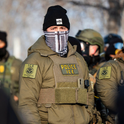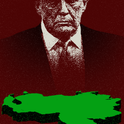I thought I would make a start on evaluating President-Elect Donald Trump’s use of the English language, for those who hold faith that the soon-to-be most powerful man on Earth knows what he’s talking about.
The following glossary must be seen only as preliminary notes on the Trump idiolect. For instance, there is a debate over whether he says “bigly” or “big league”—the NYU phonetician Tara McAllister Byun has inclined to the latter, arguing that the “velar pinch and stop closure/burst” suggest “big league.” But until Trump settles the matter himself it is prudent to include both.
Certain of his syntactic idiosyncrasies still need nailing down, too. He sometimes, but not always, talks about himself in the third person. “Nobody would be tougher on Isis than Donald Trump,” he said in the campaign. Whether there’s a psychological or a brand-management rationale for that is outside the scope of this article, but it’s an identifiable feature of his discourse.
There is free semantic variation between various adverbial intensifiers, including the “bigly” and “big league” I mentioned. But they are always used in predicative positions. Trump says “I’m going to cut taxes bigly”; never “I’m going to bigly cut taxes” or (were he prissy about split infinitives) “I’m going bigly to cut taxes.”
“Sad!” is always a standalone sentence punctuated thus. “Unfair,” in some uses equivalent to “sad”(cf. “Unfair!” and its cousin “Very unfair!”), can also be used in attributive position, where it takes on the meaning of “rigged” or “biased,” as in “the very unfair New York Times.”
The building blocks of Trump-speak are not nouns and verbs (he’ll use “win,” “lose” and “make” but if in doubt defaults to copular or linking verbs), but adjectives and adverbs. “Very” and “so,” both solus and in their reduplicated forms, are the workhorses of President-Elect Trump’s communicative strategy. They flock freely with any modifiers that will have them. They are—to stretch a metaphor—the drunk millionaires rampaging through the President-Elect’s vocabulary whorehouse.
There’s often a defined syntactic pattern to their use, though; what linguists sometimes call a snowclone or catch-structure. That is, a sentence is constructed, usually with a linking verb, with an adjectival subject complement; then the subject complement is repeated with an intensifier. “The wall I build is going to be so beautiful. So, so beautiful.” “She’s a nasty lady. Very nasty lady.” Around this pattern various subtleties can be built: phatic interjections such as “by the way” and “believe me” can be spliced in.
The way to think about Trump-speak, then, is not so much in terms of a stream of meaningless gobbledygook as a narrow set of combinatorial operations performed on a small number of words and phrases. Imagine a haiku master working with a handful of images and tropes; or, if you prefer, a toddler with a small set of Lego Duplo bricks.
Further work, I acknowledge, needs to be done on the question of “meaning,” to those who speak other tongues. But (see “nuclear”, “Hindu”, “yuge”) I’ve made a tentative start.
Amazing (adj): see “beautiful”
Bad (adj): see “nasty”
Beautiful (adj): see “fantastic”
Believe me (phatic sentence fragment): see “by the way”
Biased (adj): see “rigged”
Big league (adv; always used predicatively): see “bigly”
Bigly (adv; always used predicatively): see “big time”
Big time (adv): see “very”
By the way (phatic sentence fragment): see: “believe me”
Crooked (adj): see “failing”
Failing (adj): see “horrible”
Fantastic (adj): see “great”
Great (adj): see “historic”
Hindu (noun): Hindu stuff or Hindu country
Historic (adj): see “incredible”
Horrible (adj): see “nasty”
Incredible (adj): see “spectacular”
Nasty (adj): see “bad”
Nuclear (noun): nuclear stuff
Rigged (adj): see “biased”
Sad! (adj; always a stand-alone sentence with exclamation mark): see “unfair”
So (adv): see “so, so”
So, so (adv): see “very”
Spectacular (adj): see “tremendous”
Tremendous (adj): see “unbelievable”
Unbelievable (adj): see “wonderful”
Unfair (adj): see “sad!”
Very (adv): see “very, very”
Very, very (adv): see “big league”
Wonderful (adj): see “amazing” Yuge (adj): big

The President-Elect ©Michael Vadon, Wikimedia Commons
Leith on language: the Trump idiolect
The building blocks of Trump-speak are not nouns and verbs
December 14, 2016











